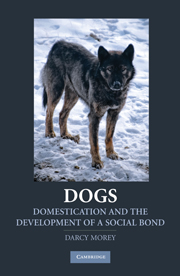Book contents
- Frontmatter
- Contents
- List of Figures and Tables
- Foreword
- Preface and Acknowledgments
- 1 Preamble to the Dog's Journey through Time
- 2 Immediate Ancestry
- 3 Evidence of Dog Domestication and Its Timing: Morphological and Contextual Indications
- 4 Domestication of Dogs and Other Organisms
- 5 The Roles of Dogs in Past Human Societies
- 6 Dogs of the Arctic, the Far North
- 7 The Burial of Dogs, and What Dog Burials Mean
- 8 Why the Social Bond between Dogs and People?
- 9 Other Human-like Capabilities of Dogs
- 10 Roles of Dogs in Recent Times
- Epilogue: One Dog's Journey
- Appendix A
- Appendix B
- References
- Index
1 - Preamble to the Dog's Journey through Time
Published online by Cambridge University Press: 05 August 2012
- Frontmatter
- Contents
- List of Figures and Tables
- Foreword
- Preface and Acknowledgments
- 1 Preamble to the Dog's Journey through Time
- 2 Immediate Ancestry
- 3 Evidence of Dog Domestication and Its Timing: Morphological and Contextual Indications
- 4 Domestication of Dogs and Other Organisms
- 5 The Roles of Dogs in Past Human Societies
- 6 Dogs of the Arctic, the Far North
- 7 The Burial of Dogs, and What Dog Burials Mean
- 8 Why the Social Bond between Dogs and People?
- 9 Other Human-like Capabilities of Dogs
- 10 Roles of Dogs in Recent Times
- Epilogue: One Dog's Journey
- Appendix A
- Appendix B
- References
- Index
Summary
Like the Dachshund that is a dog and a half long and half a dog high, the state of Tennessee has peculiar proportions.
(Kneberg 1952: 190)For one who lived and worked in the state of Tennessee for many years, Madeline Kneberg's deliciously phrased perspective holds special resonance for getting started on a book about dogs. Her comment, of course, concerns a modern breed, but modern breeds are not the focus of this book. This book is concerned mostly with how and why dogs in general came into being, and why they have the basic characteristics that they do, irrespective of modern breed standards. That said, it is still reasonable to ask a simple question: Is the world really in need of yet one more book about dogs? Over approximately the past half-century many books that center on dogs have been published, so at face value the question is legitimate. I, of course, believe that what is offered here should be desired and welcomed. But to make clear how this offering differs from previous works, it is useful to consider briefly the nature of those other contributions. Following that, it is important to spell out this book's framework, an approach that should help serve to highlight how this volume is different from others. There is no claim to exhaustiveness here, and the purpose is simply to draw attention to a series of works, mostly prominent, that I am acquainted with.
- Type
- Chapter
- Information
- DogsDomestication and the Development of a Social Bond, pp. 1 - 11Publisher: Cambridge University PressPrint publication year: 2010



